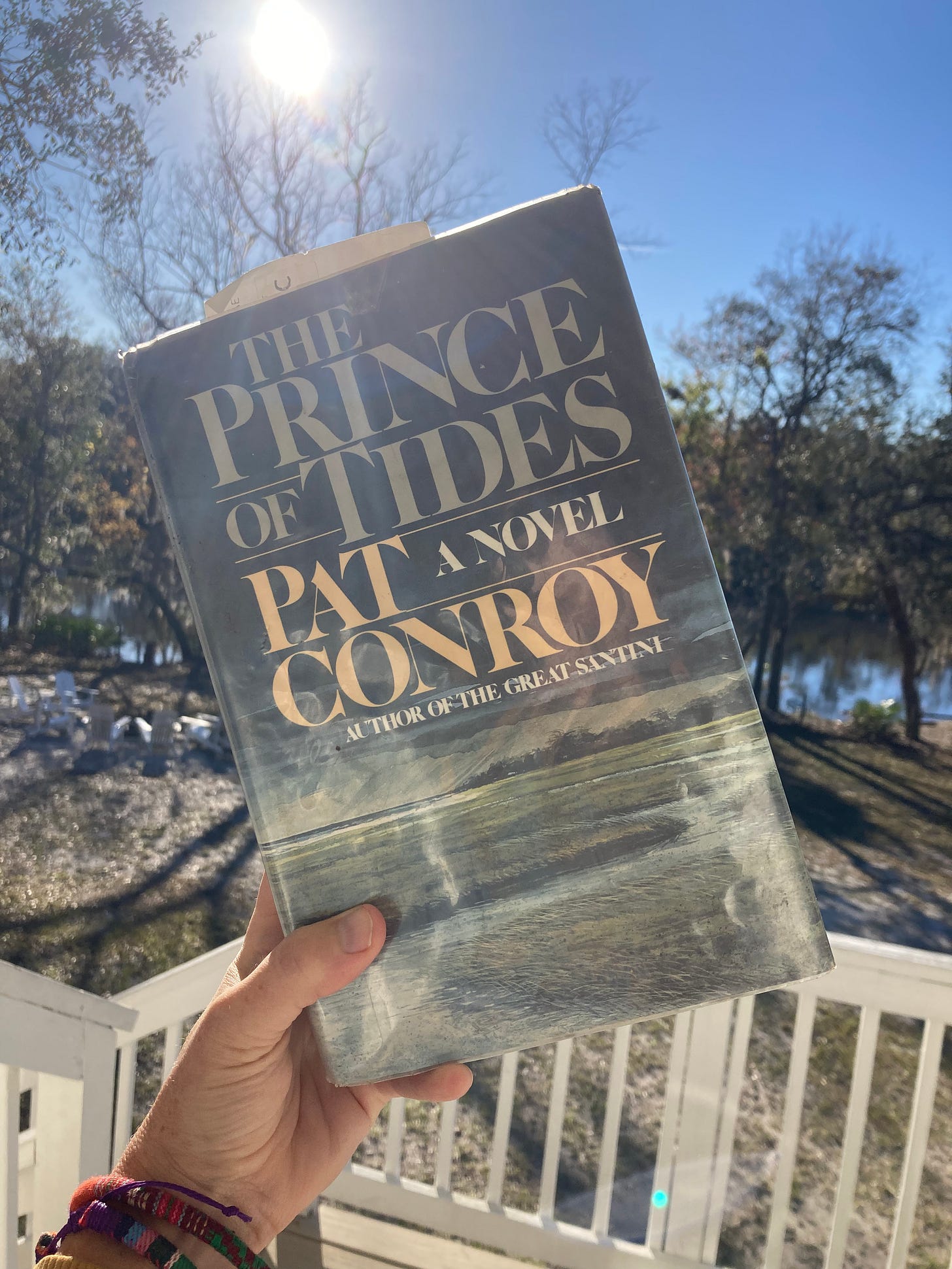On catharsis, airless writing, and Blake Butler's"Molly"
Biased thoughts on how to structure trauma writing
Hello writer friends,
I hope this dispatch finds you with some rest inside your body from the days or the weeks past. Personally, I milked my time off, spending the first week on the Suwannee River in Florida and the second week in sweatpants writing New Years’ greeting cards by the wood stove. I read a lot, I ate a lot, I even slept some. Bliss.
I want to share some of the books I read with you, specifically the polemic memoir “Molly” by Blake Butler that caused a Twitter war this month.
But first: an overview of the other titles I devoured.
While in Florida, I re-read Pat Conroy’s “The Prince of Tides” and I can not recommend this exceptional book highly enough. I think I’ll dedicate an entire post to Conroy’s use of adjectives soon, so I won’t get into the reasons for my adoration of this novel here, but if you have a little bit of vacation left, get yourself a beat-up library copy and prepare to be transported to the lowcountry on the plane of Conroy’s words.
I’m always reading two books at a time: one book for the day time, and one book for my insomniac three a.m. wake-ups. I read two nighttime titles during vacation: Sarah Blakely-Cartwright’s mind-bogglingly assured debut novel “Alice Sadie Celine” and another debut (featuring another Alice!) “Pete and Alice in Maine” by Caitlin Shetterly.1 In a nutshell, Cartwright’s novel is about a young woman who starts sleeping with her best friend’s mother and Shetterly’s is about a Manhattan-based family who attempt to leave both the pandemic and their marital problems behind them by escaping to their vacation home in Maine, to disastrous results.
If you liked the movie “Carol” but also like humor and tenderness, you will gobble up the glorious “Alice Sadie Celine.” If you loved Kelly McMaster’s lyrical divorce memoir “The Leaving Season” and are big on novels set in the 23rd state that involve adultery, “Pete and Alice in Maine” is definitely for you.
As I write, my new daytime book is Margo Steine’s “Brutalities: A Love Story” which—so far—shows the author trying to overcome an addiction to abusive men she picked up as a teenager when she was recruited to work as a dominatrix after school, and I don’t have a nighttime book yet. I’m thinking something by Bill Bryson, because I haven’t read him in a while, or maybe “Lessons in Chemistry” because I appear to be the last human who hasn’t read this novel yet.
But today, I want to talk to you about a memoir I finished this week, Blake Butler’s polemic “Molly.” (A head’s up: the rest of this post will discuss suicide, depression, and suicidal ideations—if you need to get off the bus here to take care of yourself, please do.)
If you’re not on Twitter, you might have missed the barnstorm around this title. Blake Butler manages to cause a stir with lots of his books (he’s written nine so far) often because of how these publications come about (he has claimed to have written books in a single sitting, in a week, in a fever dream) or because of how he publishes them (in a renegade manner with guerrilla flare) or, I don’t know, because he lives in Atlanta instead of New York, who knows. But this memoir really stirred the pot. In “Molly,” Blake tells the story of his wife, the poet and baker Molly Brodack’s suicide, and the many disenchantments he discovered about her after her death. A few weeks back, seemingly every writer on Twitter had an opinion about this book, even though very few had read it—its small print run sold through quickly and the book was out of stock. Most of the pushback online was about the liberties Butler took as a memoirist—that he reprinted his late wife’s suicide letter in toto, including texts and sexts and unpublished work of hers, that she wasn’t there to defend herself against any of this, leading to questions of what is permissible to use in memoir, and whom a life belongs to: bottomless questions that I won’t debate here.
What I want to talk about instead is craft and the crafting process of a book that deals with trauma. Before I go on, I should clarify that everything I’m going to say about Butler’s memoir is subjective and personal to me, reflecting what I long for as a reader and a writer. I’m not big on writing book reviews of other writers’ work because I lack the magnanimity (or schooling) to judge their strengths and weaknesses outside the perimeters of my own aesthetics. Unless a book provided me with a “perfect” reading experience—lifting me out of my everyday and keeping me riveted to the material through the plot and prose, presenting a voice that is both unique and readable—I can’t shut off the inner writer/editor voice that would have done X or Y thing to create a more palatable reading experience for myself. But writers aren’t writing books for me specifically, so to negatively review a book because it didn’t hit my own marks would be a selfish exercise, and a cruel one. So what I’ll be sharing about Blake Butler’s “Molly” isn’t a review. It’s a list of thoughts about the way the book was written, structured, and published that I hope might give you some insight into the way you’re working on your respective projects, especially if you are working on a project that involves trauma and/or catharsis of some kind.
Ready? Get something warm to drink—this is going to be a ride.





